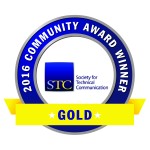Here are some photos of your IDL SIG at #STC16.
Also see the 2016 Business Meeting Presentation.


Website for the STC Instructional Design & Learning Special Interest Group, a Community of Practice
Here are some photos of your IDL SIG at #STC16.
Also see the 2016 Business Meeting Presentation.

Did you miss the 2016 Business Meeting at #STC16? Here are our slides from the meeting.
Or download the 2016 Business Meeting Presentation PowerPoint.
 As a member of the Community Achievement Award Evaluation Committee, it is my honor to inform you that the STC Instructional Design and Learning SIG has earned the Gold Community Award for your community’s activities in 2015. The citation on your certificate will read:
As a member of the Community Achievement Award Evaluation Committee, it is my honor to inform you that the STC Instructional Design and Learning SIG has earned the Gold Community Award for your community’s activities in 2015. The citation on your certificate will read:
“For your strong and consistent promotion of STC and the IDL SIG through active participation in the 2015 Summit and your excellent educational offerings, including your very creative Virtual Progression program.”
You are to be congratulated on the high value you offer to your membership. The CAAEC hopes that your community will continue to aspire to a high level with a set of impressive activities next year. For planning purposes, the 2016 CAA application (slightly updated) will be posted to the STC website soon.
Congratulations to all members of the STC Instructional Design and Learning SIG!
MaryKay Grueneberg
Community Achievement Award Evaluation Committee (CAAEC) Chair
Have you ever asked yourself how much our profession will grow if we do not nurture and encourage new entrants? Think of how you would have grown if you did not have the guidance of a professor or more knowledgeable colleague to instruct you in proper methods of technical communication and instructional design. Without guidance, you may have, like a plant without water or nutrients, withered and died. At the least you may have become frustrated with the profession.
This is what individuals who have subscribed to the STC Mentor Board as mentees may be feeling. These individuals have created mentee accounts and are waiting for more knowledgeable professionals to offer advice and support. Currently there are individuals who are in college, graduate school, and those wishing to transition into technical communication and instructional design from other professions.
Clicking on the following link http://www.stc.org/education/1414-mentor-board or clicking on this STC Mentor Board link will allow you to create a mentor account. After creating the mentor account, you can search for mentees and assist a new professional.
Embarking on a training mission to India and realizing that more and more companies are offshoring their technical communication/instructional design functions, I was surprised to find that the offshoring of these jobs to India is not the major force for the employment of Indian technical communicators, but that there is a need to train individuals in the profession. In Offshoring and Serving the Needs of Indian Technical Communicators with Online Technical Communication Programs: A Feasibility Study, Wang and Baake, the former a PhD student and the latter a professor at Texas Tech University, state that in India, not only the growth in information technology has fueled the need for technical communicators, but also the industrialization of the country. India is investing in manufacturing and with this comes the need to document the products being produced for the global economy. This increase has spurred a demand for education in technical communication. According to Wang and Baake, ” there is little training in technical communication offered at Indian universities.” According to the Society for Technical Communication (STC) India chapter’s Web site, there is no formal education curriculum in the field of technical communication, although since the 1990s there has been a rise in the number of technical communication professionals. Wang and Baake analyze the barriers to educate Indian individuals interested in further enhancing their technical writing skills through an online program of learning.
Barriers involve:
Personal experience reveals that the Indian technical communicator is good at delving into source documents but due to the lack of education in technical communication techniques is not good at discerning what is important and what can be eliminated from publication. This results in the need to edit and reformat documents received from the Indian technical communicator. This has also resulted in companies, not educational institutions, to educate Indian technical communicators in the formal methods of technical communication. Universities though may be able to license their programs to Indian universities thus deriving royalties for their curriculums. This may be a way to introduce a universal standard into Indian technical writing based on a body of knowledge and benefit from input from Indian technical communicators.
Source: Baake, K. & Junhua Wang, (2006). Offshoring and Serving the Needs of Indian Technical Communicators with Online Technical Communication Programs: A Feasibility Study. Technical Communication, 53(4), 427-438. doi: Article